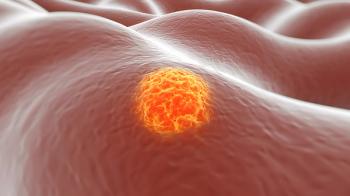
Powerful Antibody Shows Early Promise in Metastatic Melanoma
An engineered CD40 antibody that can bind to a specific immune receptor and directly injected into tumors has demonstrated in a phase 1 trial that it can trigger a systemic immune response.
A first-in-human study from researchers from Memorial Sloan Kettering Cancer Center and The Rockefeller University demonstrated that a re-engineered CD40 antibody delivered directly into tumors can trigger systemic immune responses without the severe side effects that doomed earlier versions of the treatment.
The
“Seeing these significant shrinkages and even complete remission in such a small subset of patients is quite remarkable,” first author Juan Osorio, M.D., said in a news release. Osorio is a medical oncologist at Memorial Sloan Kettering Cancer Center and a visiting assistant professor in the Leonard Wagner Laboratory of Molecular Genetics and Immunology at The Rockefeller University.
For more than two decades, scientists have tried to harness a protein called CD40 to boost the immune system’s ability to recognize and destroy tumors. CD40 acts as an on-switch for immune cells, activating the antigen-presenting cells that teach the immune system to recognize cancer. When CD40 gets triggered properly, it can launch a coordinated immune attack against tumors.
But earlier attempts to develop CD40-targeting drugs ran into trouble. When given systemically throughout the body, these medications caused dangerous drops in platelet counts and liver damage. The side effects were severe enough that multiple clinical trials failed, and the approach seemed stuck.
The research team took a different tack. They made two key changes to create 2141-V11: they re-engineered the antibody to bind more effectively to a specific immune receptor, and they switched from systemic administration to direct injection into tumors. This local delivery approach meant far less drug circulating in the bloodstream.
The treatment worked. Among the 12 patients treated across four dose levels, none experienced the dose-limiting toxicities that plagued earlier studies. The most common side effects were mild-to-moderate fever and chills, typically lasting less than an hour after injection. Platelet counts and liver function remained stable.
Analysis of patient samples revealed how the treatment works. The injected antibody created structures called tertiary lymphoid structures within tumors. These organized clusters of immune cells essentially turned “cold” tumors into “hot” ones, creating local training grounds where the immune system could learn to recognize and attack cancer cells. The effect spread systemically, with activated immune cells traveling to distant tumors that had never been directly injected.
“This effect — where you inject locally but see a systemic response. — that’s not something seen very often in any clinical treatment,” said Jeffrey V. Ravetch, M.D., Ph.D., Theresa and Eugene M. Lang Professor, Leonard Wagner Laboratory of Molecular Genetics and Immunology at The Rockefeller University. “It’s another very dramatic and unexpected result from our trial.”
The study enrolled patients whose cancers had proven resistant to multiple prior treatments, including five to 14 previous therapy lines. Both complete responders had been treated with numerous approaches before enrolling. An 89-year-old woman with recurring melanoma on her leg saw all visible lesions disappear by her 15th treatment cycle. She remained in remission for 28 months total. A 67-year-old woman with breast cancer that had spread to her skin, lymph nodes and liver achieved a complete response, with even non-injected tumors shrinking away.
“Over the last 20 years, several first-generation CD40 agonists [antibodies] were developed and tested in patients with cancer. However, they demonstrated dose-limiting systemic toxicities (mainly cytokine release syndrome, thrombocytopenia, and transaminitis) and had limited clinical benefit,” the study authors wrote. “Our study provides clinical proof-of-concept that [the experimental therapy] is a safe and potentially effective therapeutic approach for a subset of patients with cancer.”
Several ongoing studies are now testing 2141-V11 in either phase 1 or phase 2 trials in specific cancer types, including bladder cancer, brain tumors, and prostate cancer. Collectively, nearly 200 people are enrolled in the studies.
Newsletter
Get the latest industry news, event updates, and more from Managed healthcare Executive.

























